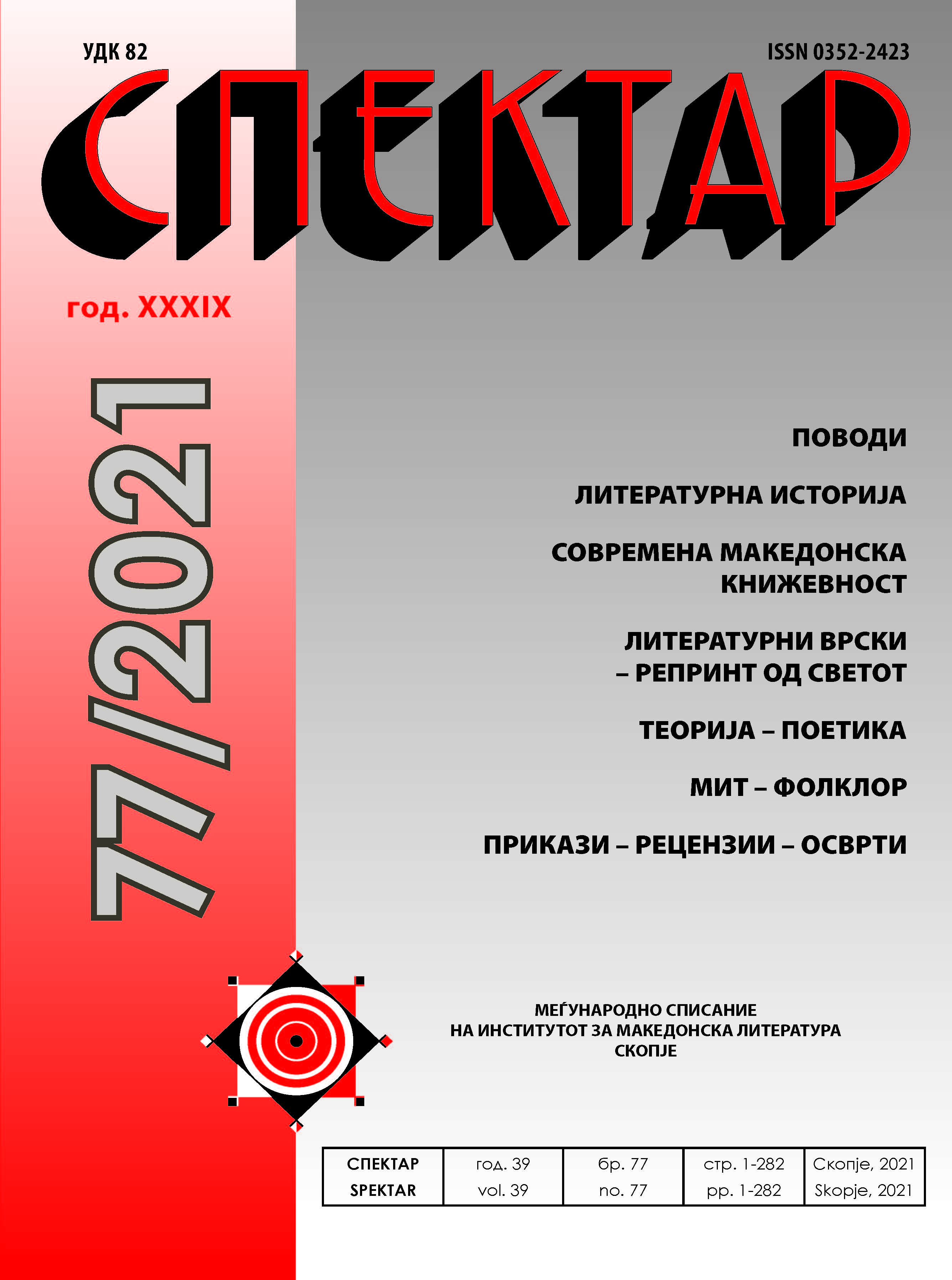KНИЖЕВНИОТ АРХИВ НА КОЛЕ ЧАШУЛЕ (ПО ПОВОД 100 ГОДИНИ ОД РАЃАЊЕТО НА КОЛЕ ЧАШУЛЕ)
KOLE ČAŠULE’S LITERARY ARCHIVE
Author(s): Nataša AvramovskaSubject(s): Macedonian Literature
Published by: Институт за македонска литература
Keywords: Kole Čašule; investigation; faktion – fiction; literary memory
Summary/Abstract: Kole Čašule, a playwright, novelist, and essayist who has written twenty-four plays, twelve novels, four collections of short stories and six books of essays, is one of the founding fathers of contemporary Macedonian literature. He has significantly influenced its decades-long modern development. His works have been translated, his plays staged in scores of languages. He has received numerous awards, in Macedonia and abroad. In 2003, he was elected honorary member of MANU (The Macedonian Academy of Sciences and Arts). As the number of Kole Čašule’s plays grew, they became milestones in the development of the modern Macedonian drama. His play, An Empty Gourd in the Wind/Вејка на ветерот (first staged in 1957), represents the beginning of modern Macedonian dramaturgy, while plays, As You Like It / Како што милувате (1974) by Čašule and Jane Zadrogaz Јане Задрогаз (1974) by Goran Stefanovski launched the postmodern age of the Macedonian vernacular drama. And then there is, of course, Kole Čašule’s play Darkness/ Црнила (1960/61), its title and content deeply rooted in the collective memory of the Macedonian people; a few decades ago it became a symbol of the survival of the community throughout history. Kole Čašule in his large and diverse body of work characteristically frames the represented world oscillating between reality and fiction. This represented world, in fact, is best defined by the author himself in the words of the title of his late novel: So It Is (If That’s How It Seems To You)/ Така е (ако ви че чини). In another case, he simply uses the title As You Like It/ Како што милувате, referring to the famous play of the Elizabethan era. What seems like a leisurely and ad hoc allusions to a variety of possible readings and interpretations of the world reflected in his plays, serves in fact as a trap to draw readers into an abyss of contradictions (there are as many versions of the truth as there are witnesses!) and insinuations (behind-the-scenes dealings and reworking of situations/reality). The total narrative world of Čašule’s work displays in fact a strongly dramatic quality: the dramatic tension of the opposing voices lead the story to its culmination. This quality makes the world reflected in Čašule’s work relate to the worlds of the great playwrights of the modern drama, who focus on conflict between reality and fiction: like Luigi Pirandello with his ‘naked masks’ or Yukio Mishima and his schizophrenically split reality in the modern Noh-Plays. At the centre of Kole Čašule’s dramatic world appear the ideological and political aspects of this inability to distinguish between reality and fiction. His main characters, split between the planes of reality and fiction (a simulation of reality), provide the basis for the dramatic conflict. In fact, it seems that in his works reality disappears entirely, fictionalized through a series of fabricated scenarios. It does not matter whether he reworks the immigrant theme (An Empty Gourd/ Вејка на ветерот, Home-bounders/Роднокрајци) or a an aspect of the totalitarian regime (Whirlwind/ Вител, A Musical Score for a Miron/Партитура за еден Мирон, A Divertissement for a Strez/ Дивертисман за еден Срез), or a play or novel that refers to Macedonian national history (Darkness/Црнила, Judgment/Суд, Standing Upright/Простум, So It is (If That’s How It Seems To You)/Така е (ако ви се чини); the basis for the dramatic plot is always focused on the confrontation and blurring of the planes of reality and its simulations, fabricated and constructed forgeries. In his plays, Čašule reveals hidden, controlled from behind-the-scenes hints of life’s dramatic events. Thus, the work of Čašule reveals the drama of existence as the tragedy of human beings entirely uncertain within a reality which cannot distinguish itself from its numerous simulacra – manipulated by totalitarianism (A Musical Score for a Miron/Партитура за еден Мирон, A Divertissement for a Strez/ Дивертисман за еден Срез), political terrorism (Darkness/ Црнила) or the official scene of social interaction (An Empty Gourd…/ Вејка...). Čašule’s work depicts on one hand how reality is being fictionalized, on the other, the effect of this fictionalization: an impossibility to reach reality through glimpses of its simulacra. In his artistic world, he views reality as being fictionalized to the same degree as narratives in literature, historiography, or law. These auto-referential and complex aspects of Čašule’s work alluding to the circumstances of a given social and cultural communication, call for new readings and interpretations now when he is gone and we celebrate the anniversary of his birth.
Journal: Спектар
- Issue Year: 2021
- Issue No: 77
- Page Range: 29-46
- Page Count: 18
- Language: Macedonian

